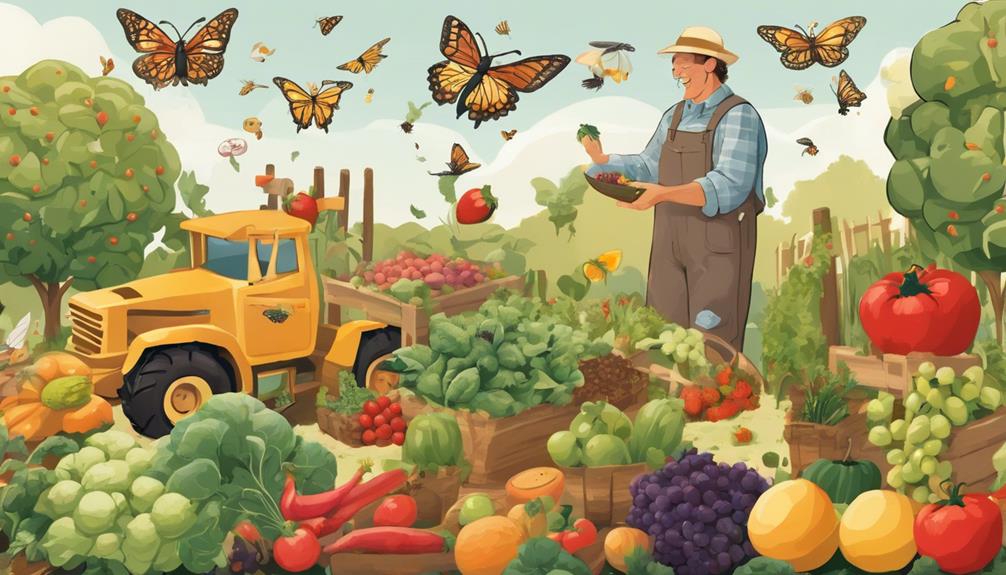7 Best Practices in Global Eco-Friendly Food Supply Chain
When it comes to optimizing sustainability in the global food supply chain, there are key practices that can enhance eco-friendliness.
From sourcing methods that prioritize the environment to innovative energy solutions, these strategies align with the growing demand for conscious consumption.
By exploring each of these best practices, you can gain insights into how the food industry is evolving towards a more environmentally responsible future, making informed choices that positively impact the planet and its inhabitants.
Sustainable Sourcing Practices
When looking to implement sustainable sourcing practices in your food supply chain, prioritize transparency and traceability. By focusing on these aspects, you can ensure that your products are sourced through organic farming methods and ethical sourcing practices. Organic farming involves growing produce without the use of synthetic pesticides or fertilizers, promoting soil health and biodiversity. By supporting organic farming, you contribute to a healthier ecosystem and reduce the environmental impact of conventional agriculture.
Ethical sourcing is another crucial element to consider when establishing sustainable practices in your food supply chain. This involves ensuring that the products you source are produced in fair working conditions, with respect for labor rights and social standards. By prioritizing ethical sourcing, you support communities and workers along the supply chain, promoting social responsibility and fair trade practices.
Integrating organic farming and ethical sourcing into your supply chain not only benefits the environment and communities but also aligns with the growing consumer demand for sustainable and ethically produced goods. By transparently communicating your sourcing practices and ensuring traceability throughout the supply chain, you build trust with consumers and demonstrate your commitment to responsible business practices. Embracing sustainable sourcing practices isn't only a step towards a more eco-friendly food supply chain but also a strategic decision that can enhance your brand reputation and competitiveness in the market.
Efficient Transport Logistics
To achieve efficiency in your food supply chain, prioritize optimizing transport logistics for streamlined operations. Ensuring that your goods move swiftly and sustainably is crucial for reducing costs and environmental impact.
Here are some key strategies to consider:
- Route Optimization: Utilize technology and data analysis to plan the most efficient routes, reducing mileage and fuel consumption while lowering your carbon footprint.
- Cold Chain Management: Maintain the integrity of perishable goods by investing in proper refrigeration systems and monitoring devices to ensure temperature control throughout the transportation process.
- Energy Efficient Vehicles: Upgrade your fleet to include vehicles with better fuel efficiency or alternative energy sources to reduce greenhouse gas emissions.
- Collaborate with Suppliers: Work closely with suppliers to coordinate deliveries, consolidate shipments, and optimize transport schedules for maximum efficiency.
- Monitoring and Feedback: Implement systems to track performance metrics, gather feedback from drivers, and continuously improve transport logistics processes for ongoing efficiency gains.
Minimizing Food Waste
To further enhance your eco-friendly food supply chain practices, it's essential to address strategies for minimizing food waste. Implementing portion control measures can significantly reduce excess food production, leading to decreased waste levels. By accurately gauging the amount of food needed for production or service, you can prevent overproduction and subsequent disposal.
Moreover, adopting effective food preservation techniques can prolong the shelf life of perishable items, reducing the likelihood of spoilage. Utilizing methods such as vacuum sealing, freezing, and proper storage can help preserve the freshness and quality of food products, minimizing unnecessary waste.
Engaging in donation programs is another impactful way to minimize food waste. By partnering with local charities or food banks, you can redirect surplus food to those in need instead of discarding it. Not only does this practice reduce waste, but it also contributes to community support and social responsibility.
Additionally, implementing composting initiatives can further enhance your waste reduction efforts. By segregating and composting food scraps and organic waste, you can divert these materials from landfills and create nutrient-rich compost for agricultural purposes.
Incorporating these strategies into your eco-friendly food supply chain practices can significantly reduce food waste, promote sustainability, and contribute to a more environmentally conscious operation.
Implementing Green Packaging
Consider integrating environmentally friendly packaging solutions into your food supply chain to minimize waste and promote sustainability. Reducing environmental impact is crucial in today's eco-conscious world. By implementing green packaging practices, you can contribute to a healthier planet while also enhancing your brand image. Here are five tips to help you get started:
- Opt for Recyclable Materials: Choose packaging materials that can be easily recycled to reduce the amount of waste ending up in landfills.
- Explore Biodegradable Options: Look into innovative materials that are biodegradable, breaking down naturally without harming the environment.
- Reduce Packaging Size: Minimize the amount of packaging used for each product to lower material consumption and transportation emissions.
- Use Renewable Resources: Consider utilizing packaging made from renewable resources like bamboo or sugarcane to support sustainable practices.
- Invest in Reusable Packaging: Implement reusable packaging solutions where possible to decrease the need for single-use materials and encourage a circular economy.
Supporting Local Farmers
Integrating local farmers into your food supply chain fosters community resilience and promotes sustainable agricultural practices. By forming local partnerships with farmers, you not only support their livelihoods but also contribute to the economic growth of the community. This collaboration empowers farmers by providing them with a stable market for their produce, ensuring a fair income for their hard work.
Community support plays a crucial role in ensuring the success of local farmers. By sourcing ingredients locally, you're investing in the well-being of the community and fostering a sense of belonging. This support goes beyond just purchasing goods; it extends to building relationships with farmers, understanding their practices, and appreciating the effort that goes into sustainable farming.
Furthermore, integrating local farmers into your supply chain can lead to environmental benefits. By reducing the distance that food travels to reach consumers, you help lower carbon emissions associated with transportation. This localized approach also promotes biodiversity and encourages the use of organic farming practices, contributing to a healthier ecosystem.
Ensuring Fair Trade Practices
Supporting fair trade practices is essential in maintaining ethical standards throughout the food supply chain. It ensures that all individuals involved in the production process are treated fairly and receive adequate compensation for their work. By promoting ethical sourcing and fostering transparency in supply chains, companies can uphold their commitment to sustainability and social responsibility.
To ensure fair trade practices in the global eco-friendly food supply chain, consider the following:
- Establishing Direct Relationships: Build direct relationships with farmers and producers to ensure fair wages and working conditions.
- Certifications and Labels: Look for products certified by reputable fair trade organizations to guarantee ethical sourcing practices.
- Supply Chain Audits: Conduct regular audits throughout the supply chain to monitor compliance with fair trade standards.
- Consumer Education: Educate consumers about the importance of fair trade practices and empower them to make ethical purchasing decisions.
- Collaboration and Partnerships: Collaborate with other businesses and organizations to advocate for fair trade policies and support initiatives that promote transparency in supply chains.
Promoting Biodiversity Conservation

To enhance sustainability in the global eco-friendly food supply chain, prioritize promoting biodiversity conservation practices. One crucial aspect is habitat preservation, ensuring the protection of various ecosystems where food is sourced. By safeguarding habitats, you support the diverse plant and animal species that play a vital role in pollination, pest control, and overall ecosystem health. Additionally, wildlife protection is essential in maintaining the balance of natural food chains and preventing species extinction.
When it comes to eco-friendly farming, integrating agroforestry practices can significantly contribute to biodiversity conservation. Agroforestry involves planting trees and shrubs alongside food crops, creating a sustainable and biodiverse environment. This approach not only enhances soil health and water retention but also provides habitats for wildlife and beneficial insects. By incorporating agroforestry into food production, you can promote biodiversity while increasing the resilience of the agricultural system to climate change.
Embracing Renewable Energy Solutions
Implementing renewable energy solutions in the global eco-friendly food supply chain is key to reducing carbon emissions and promoting sustainability. By embracing renewable energy sources like solar panels and wind turbines, food supply chains can significantly decrease their environmental impact.
Here are some essential steps to incorporate renewable energy solutions:
- Install Solar Panels: Harness the power of the sun to generate clean and sustainable energy for food production facilities and distribution centers.
- Utilize Wind Turbines: Take advantage of wind energy to supplement power needs and further reduce reliance on non-renewable energy sources.
- Implement Energy-Efficient Technologies: Integrate energy-efficient appliances and equipment to optimize energy consumption and reduce waste.
- Explore Off-Grid Solutions: Consider implementing off-grid renewable energy systems to enhance resilience and reduce dependency on traditional power grids.
- Monitor Energy Usage: Regularly monitor and analyze energy consumption data to identify areas for improvement and maximize the efficiency of renewable energy solutions.
Frequently Asked Questions
How Can Companies Ensure the Well-Being of Workers Throughout the Global Eco-Friendly Food Supply Chain?
To ensure the well-being of workers throughout the global eco-friendly food supply chain, it is crucial to prioritize fair wages and maintain supply chain transparency. Treat workers with respect and dignity by providing safe working conditions and fair compensation.
Communicate openly with employees and suppliers to foster trust and accountability. Through these practices, companies can create a sustainable and ethical food supply chain.
What Strategies Can Be Implemented to Address Water Usage and Conservation in the Production of Eco-Friendly Food?
To address water usage in eco-friendly food production, focus on sustainable farming and optimizing the supply chain. Implement water conservation practices like drip irrigation and rainwater harvesting.
Integrate technology for monitoring and reducing water waste. By combining sustainable farming methods with efficient supply chain management and technology integration, companies can make significant strides in conserving water resources and promoting eco-friendly food production.
How Do Companies Navigate the Complexities of International Regulations and Certifications When Sourcing Sustainable Ingredients?
When navigating regulations and certifications for sourcing sustainable ingredients, companies face supply chain complexities. It's crucial to stay informed about international requirements and standards.
Streamline processes to ensure compliance while sourcing eco-friendly components. Collaborate with suppliers who prioritize sustainability and hold relevant certifications.
What Role Do Technology and Data Analytics Play in Enhancing Transparency and Traceability in the Eco-Friendly Food Supply Chain?
In the eco-friendly food supply chain, technology and data analytics are crucial for enhancing transparency and traceability. Supply chain stakeholders rely on these tools to track the journey of ingredients from farm to table, ensuring sustainability and ethical sourcing practices.
How Can Companies Effectively Communicate Their Commitment to Sustainability and Eco-Friendly Practices to Consumers and Stakeholders?
When it comes to effectively communicating your commitment to sustainability and eco-friendly practices, engaging stakeholders is key. Share your initiatives through various channels, such as social media, websites, and packaging.
Show transparency by highlighting your eco-friendly certifications and partnerships. Encourage feedback and interaction to build trust with consumers.
Conclusion
Overall, implementing these best practices in your global eco-friendly food supply chain won't only benefit the environment but also your business.
By sourcing sustainably, reducing food waste, and supporting local farmers, you can make a positive impact on the planet.
Embracing renewable energy solutions and promoting biodiversity conservation further showcase your commitment to sustainability.
Remember, every small change you make contributes to a healthier and more sustainable future for all.
